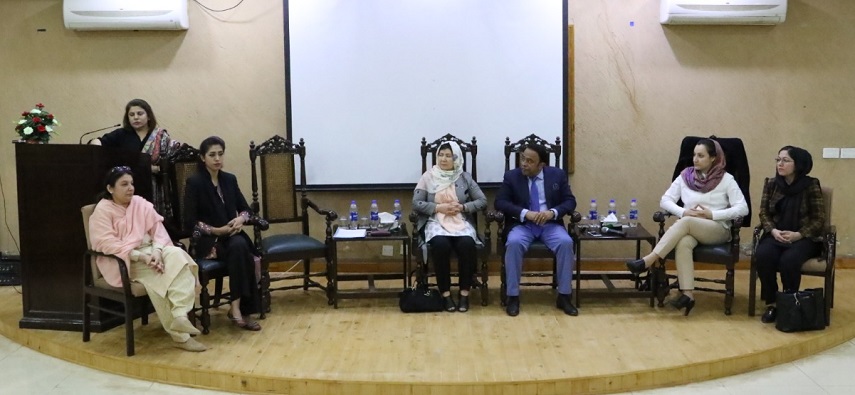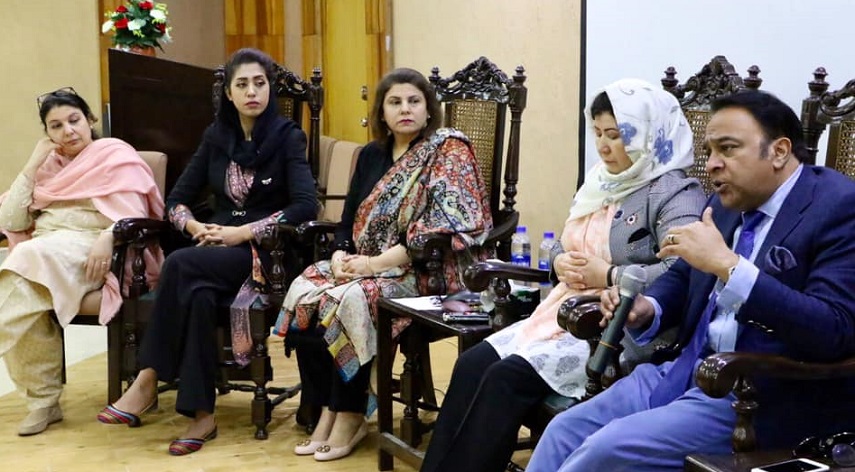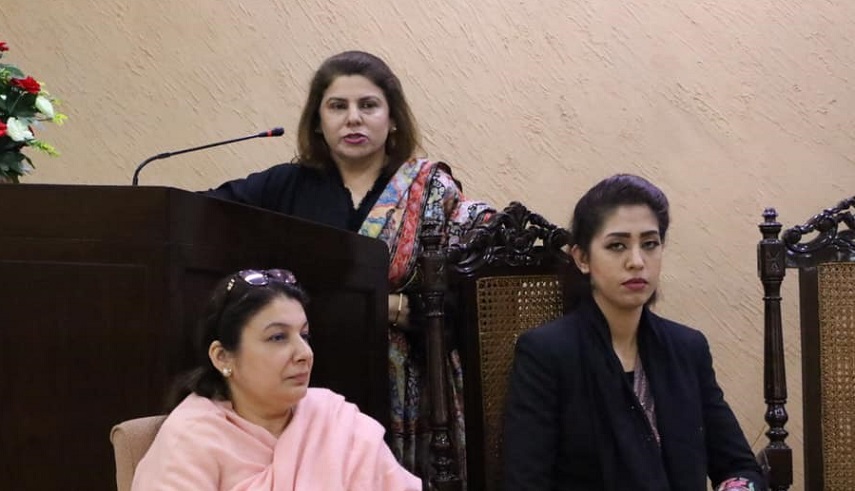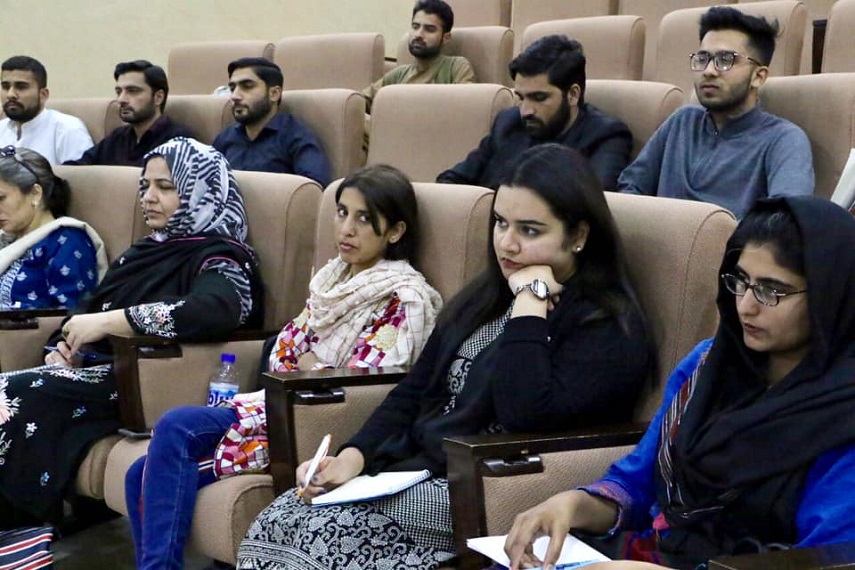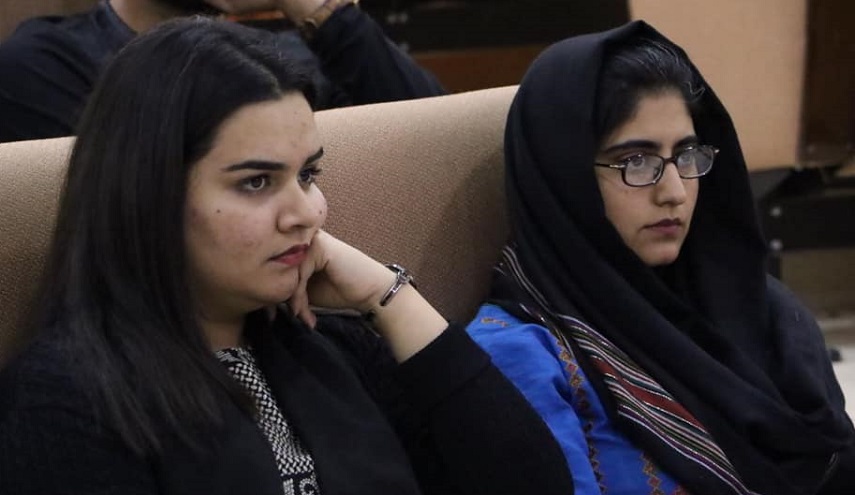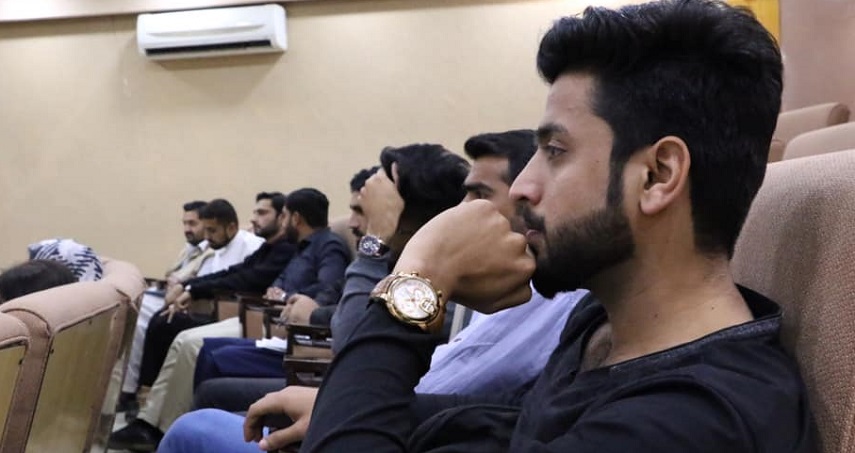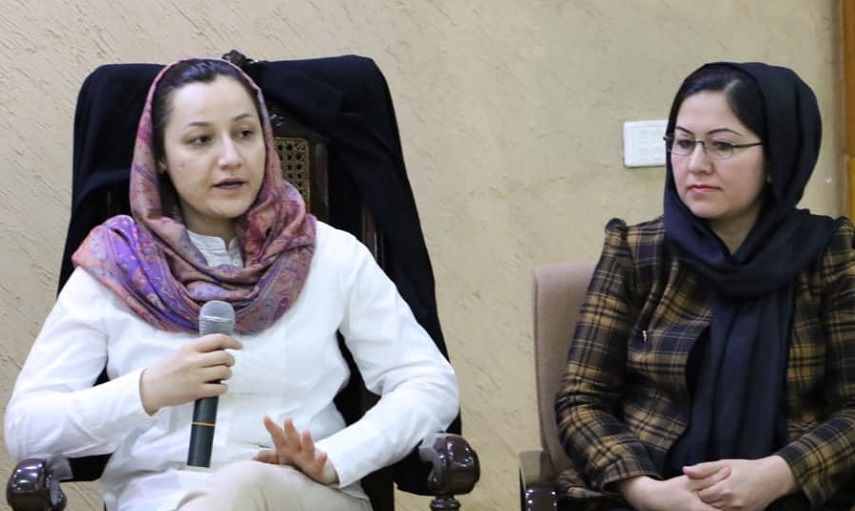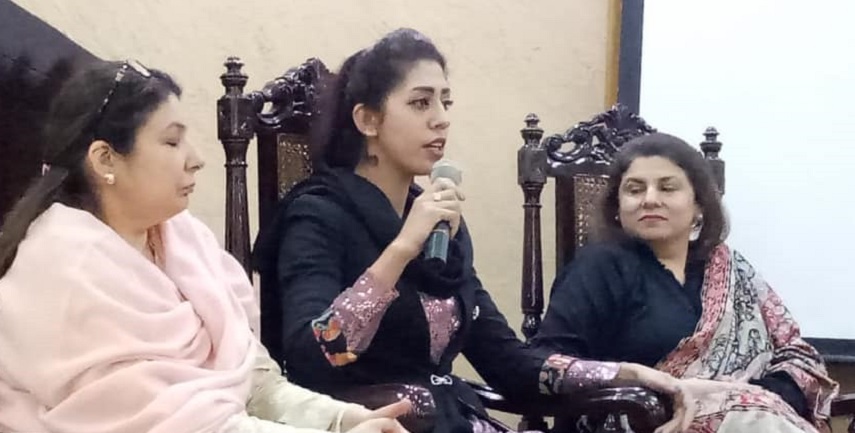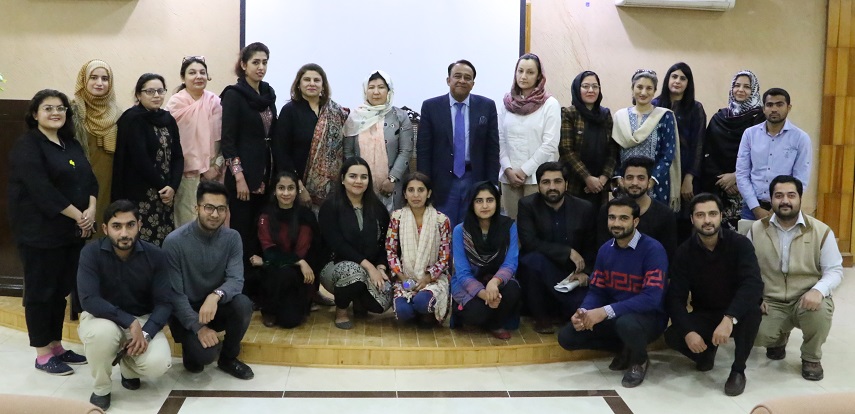On February 18, 2020, as part of Afghan women leaders’ delegation’s visit to Islamabad, CRSS organized a seminar at the Department of Defense and Strategic Studies (DSS), Quaid-I-Azam University, Islamabad. The seminar was attended by over 20 faculty members and students in the fields of Gender Studies, International Relations, and Strategic Studies.
Dr. Shabbana Fayyaz, the head of the department of the Defense and Strategic Studies Department, warmly welcomed the Afghan and Pakistani women leaders delegations, who had been invited to deliberate on the issues specific to women and their role in the socio-economic development and peace building of both countries.
CRSS Project Director, Mr. Aized Ali, explained the purpose of the visit of the Afghan women leaders, in addition to the past activities conducted under CRSS’ Pakistan-Afghanistan Track 1.5/II initiative ‘Beyond Boundaries’, as a way to bring the people of the two countries together through positive interaction and exchange of ideas to improve the relations between the two countries and benefit from mutual cooperation. He stated that the need of bringing women leaders from both sides together on such a platform emerged considering that women constitute over 50% of the population in both countries. He further stated that as the youth also constitute over 60% of the population in both countries, CRSS also has ongoing activities to bring the youth from both countries on the same platform to interact and exchange ideas to mitigate perceptions and work for peace-building and development.
Terming the delegation to be a peace-making group of leaders, Dr. Shabbana then invited the delegates to introduce themselves and opened the floor for an interactive question and answer session.
In response to a question regarding maintaining the peace-building process in Afghanistan, asked by a student of DSS Khuram Shehzad, Ms. Momina Yari, the head of the Afghan delegation, emphasized that it depends on the will and efforts of the international community, the regional stakeholders, and specifically, neighboring countries like Pakistan. If they are all on the same page in bringing about peace, the process can be maintained and can finally lead to sustainable peace in Afghanistan, in particular, and in the region, in general.
Hassan Raza, from DSS department, asked how the Afghan women perceive the intra-Afghan peace talks following the US-Taliban peace deal and how it would impact them. Ms. Freshta Zuhal Rahman responded that for the peace to remain sustainable in Afghanistan, the inclusion of women in the process is indispensable. Their issues and demands have to be addressed and their rights have to be safeguarded, she emphasized. Fortunately, she said, the Afghan government fully supports women’s role in the process and would safeguard their rights in any future deal with Taliban.
Another student from the DSS department, Hania Wazir, asked how the gender issues will be addressed in the intra-Afghan peace talks. In response, Ms. Freshta stated that there is women representation in the peace process from the Afghan government, though, pointing out that there is none from the Taliban side. The biggest concern, she stated, is that whether the women, who are part of the peace process, can represent all the women of Afghanistan and the issues they are facing or not. However, she went on to say that the women of today’s Afghanistan are not the same as two decades ago; they are more aware of their rights and are constantly struggling for them and know how to raise their voices and safeguard their rights. Ms. Freshta hoped that the Afghan women would not bow down to the previous Taliban-dictated way of life after the peace deal.
Pakistani delegate, Ms. Samima Durrani, a development professional and having more than 20 years’ experience working in Afghanistan, reinforced Ms. Freshta’s view, stating that she had also observed a huge difference in the young women of Afghanistan today who are more active, both in politics and civil society initiatives, as well as they know how to fight for their rights. Comparing the women of Afghanistan that she sees today to the ones she saw in her development work in Afghanistan two decades ago, she has observed that the women in Afghanistan comparatively now have a great influence in the decision-making spheres.
Another participant in the audience inquired regarding the legitimacy of the Kabul government, especially in the view of the Taliban, and asked how that would affect the intra-Afghan peace talks. In response, Ms. Ghazalan Koofi, agreed that it was one of the hurdles in the way of the intra-Afghan peace dialogue as the Taliban continue to take the Kabul government for a US puppet and not as a representative government of the people of Afghanistan. As a result, she stated that other political figures, such as former President Hamid Karzai and other warlord-turned politicians, have taken the opportunity to engage with them in the absence of the Kabul government.
Regarding a question on whether there is a possible formation of an Afghan delegation to talk with the Taliban, and in this scenario, how the Afghan women would find themselves a place which would be predominantly occupied by the warlords and the male dominated political elite, Ms. Freshta explained the women in Afghanistan are very well represented in every Loya Jirga or the Great Council of the country. Women were also very well represented in the recent Peace Jirga where women from every walks of life participated, she said.
A participant form NIPS asked the Afghan delegates if they consider themselves as true representatives of the Afghan women as a whole, and if Taliban bring women in their delegation; who would likely be the traditional Afghan women, how would they bridge their opinions with them. Ms. Momina Yari debated on the term ‘representation’ and stated that what was more important than the symbolic representation of women in the Afghan government and at peace-negotiations was their true engagement and equality in the decision-making processes that affect their lives ultimately as well. She added that the civil society, in this regard, with the help of the international community, was reaching to the grass root level in all province; hence, even rural women are no longer completely secluded.
In response to another question regarding whether the civil society’s women have any interaction with the women that are supportive of Taliban, Ms. Freshta responded in the negative, stating that it would be a surprise for us all if an educated woman would support the Taliban’s narrative. Adding to this, a faculty member at the Quaid-I-Azam University, stated that the Taliban are, in fact, in a state of transition where their worldview in general and about women, in particular, is changing. In one of her students’ PhD dissertation, she stated, she came across a number of declarations by the Taliban in which they showed their support for women’s education and work. Thus, it appears that the Taliban may have realized that the circumstances have changed and they should adapt themselves.
Afghan delegate Ms. Zahra Furmoly, in her remarks, stated that the US will not bring peace to the region, nor Europe or any other country; it is the people in Afghanistan and Pakistan themselves, as neighbors, that should work jointly to bring peace between themselves and in the region. She urged all Muslim countries to play their constructive role of bringing peace in Afghanistan and the Muslim world, at large. She stated that terrorist attacks in Afghanistan and Pakistan have greatly affected both the countries. As a journalist, she stated, she does not view anyone from the lens of ethnicity or nationality but as a human being. Thus, she stressed that the mindset in both countries needs to be made positive and constructive for genuine peace efforts. She invited women leaders on both sides to play this constructive role, stating that it is only then that the situation can be improved in a sustainable manner. The seminar ended with a group picture.

